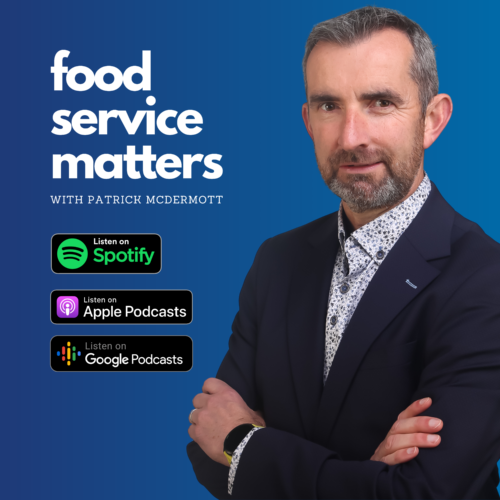The food service industry is undergoing a rapid transformation, driven by technological advancements that are reshaping every aspect of the customer experience. From mobile ordering and contactless payments to smart kitchen management systems, technology is revolutionising how catering services operate. As these innovations evolve, they bring both exciting opportunities and unique challenges.
In Season Two, Episode Seven of the Food Service Matters podcast, host Patrick McDermott interviews Rebecca Stevenson, a seasoned food service consultant with over a decade of experience in hotel management and workplace catering for major companies.
In this article, we explore Rebecca’s insights into how technology influences the customer experience in food service, the challenges that come with new tech solutions, and emerging trends in the sector.
Shaping the Customer Journey with Technology
New technology is transforming the food service industry, particularly by enhancing the customer experience. According to Rebecca, the integration of tech tools into the dining experience must streamline the ordering process, focusing on convenience and efficiency.
Technology, she argues, isn’t just about the gadgets. It’s about improving the entire experience, from the moment customers place their order to when they leave the dining area. In some cases, innovative approaches can minimise human error and optimise customer throughput, especially in large-scale environments like corporate canteens and office spaces.
Describing a recent visit to a large bank in Moorgate, Rebecca notes how advanced technology is being used to manage the flow of tens of thousands of employees.
“They have a micro-market where you self-scan, and if you don’t make a transaction and pay for anything, your photograph is taken on the way out. That’s how they manage security. There’s also click-and-collect so that you can preorder, as well as tills on every counter to pay on the spot. The customer journey and how technology plays a role in it is really well-executed,” she explains, pointing out that the goal is to enhance convenience while ensuring security and smooth service flow.
Balancing Efficiency and Customer Experience
While the potential for efficiency is enormous, Rebecca also highlights that technological solutions mustn’t negatively impact customer satisfaction.
“The big challenge isn’t so much about the technology per se, but how it’s integrated into the customer experience and making that work well with the technology itself,” she says. Effective use of data plays a vital role in achieving this balance.
For example, gathering data from technology to understand how many transactions occur during peak hours or what types of meals are most popular allows food service operators to better plan staffing and inventory. Rebecca notes, “Having good quality data is absolutely integral to us being able to plan forward and think ahead, not just for design, but also operationally.” This data driven approach ensures operations not only run efficiently but also meet evolving customer demands.
Future Technology Trends in Food Service
Advancements in food service technology are set to keep growing. Rebecca believes there will be a continuing focus on ESG, with a particular need for systems like DigiTally that can provide actionable data in real time. By analysing data trends using technology, food service operators can make smarter decisions, whether it’s adjusting menus, managing waste or reallocating resources to match demand.
“If you have good data, you can operationally plan a great solution,” Rebecca stresses. “From this, the caterers know how the customer base behaves, what to change or enhance, and which products to nudge people towards.”
The evolution of technology integration is reshaping how food service operators interact with both customers and their own systems. That being said, success lies in thoughtful implementation. Rebecca’s experience highlights that the future of food service will depend on how well businesses can leverage these tools to create a smooth, rewarding experience for everyone involved.
To listen to Patrick’s full interview with Rebecca Stevenson, check out the Food Service Matters podcast on Spotify, Apple Podcasts or Google Podcasts.
Patrick is CEO of DigiTally, which is playing an increasingly important role as an intuitive and interconnected simple food service software that helps save time, increase margins and combat food waste. Keen to learn more? Let’s talk! Book a 30-minute call with Patrick and get your demo set up today.




